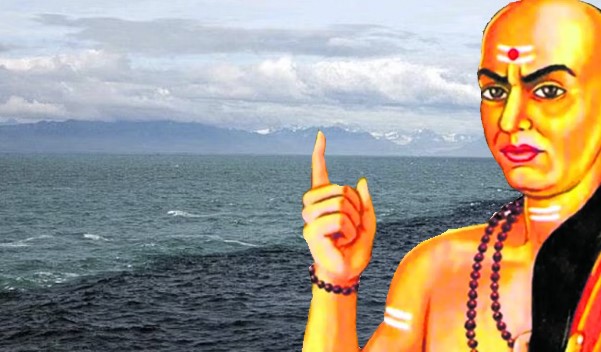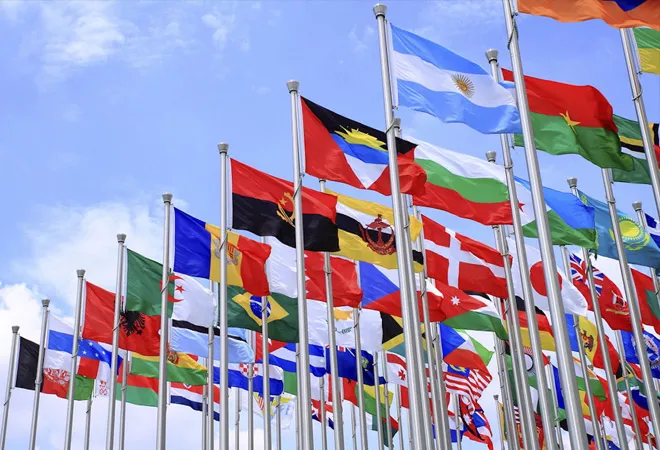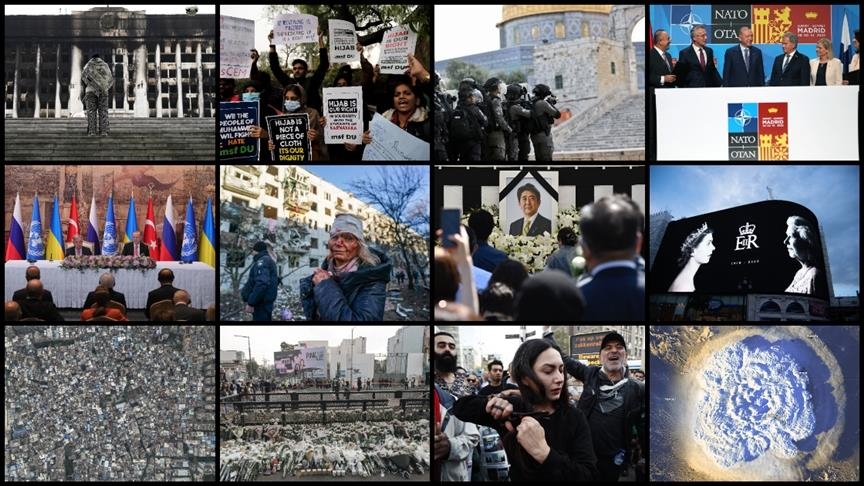The present world is facing many such crises which have disrupted normal human life, but despite all these problems, one special thing is that the presidency of the world's largest global group G20 is in the hands of a country, in whose culture the world is considered one family and where the roots of democracy exist from the time when most of the world's civilizations were in their initial stages. In such a situation, India's ancient principles and Indian policy of world order can prove to be a guiding light for the present world.
India’s G20 presidency is in full swing with events and deliberations taking place all across the country on the key global challenges of the day. Yet, there is no denying the fact that India is presiding over a deeply divided G20 amidst a global economic crisis that is hampering post-pandemic recovery. As if the pre-existing United States (US)-China strategic competition, the COVID-19 pandemic, and climate-induced disasters were not enough, Russia’s war on Ukraine has triggered an unprecedented food and energy crisis alongside soaring inflation. These global shocks are disproportionately impacting countries of the Global South—these include countries in Asia, Africa, and Latin America which are poorer and less developed, many having a colonial history—over the Global North—the wealthy and economically developed countries such as the US, Europe, Canada, etc. It is true that developing countries are particularly vulnerable to current food shortages, debt crises, and problems of inequality and poverty. As Prime Minister Narendra Modi stated, “Most of the global challenges have not been created by the Global South, but they affect us more”. Indeed, only in 2022, over 50 countries resorted to the International Monetary Fund for financial support.
Ancient Indian theories of world order
The discipline of international relations began about a century ago. Since then, this branch of knowledge has remained Western-centric. The process of universalizing realist notions of power, order, security, and national interests, along with its association primarily with superpower competition, marginalized the importance of knowledge production in developing societies.
The ancient Indian thinker Kautilya presented Rajamandal, Saptaganga theory of power (seven limbs), and Matsya Nyaya (law of fishes).All these ideas came long before Machiavelli's 'Prince', Hobbes's State of Nature, Hans J. Morgenthau's 'National Power' or Kenneth Waltz's 'Anarchy'.Broadly speaking, there are indications of Kautilya's policies in all these writings of the West. Although their cultural backgrounds are different. At present, India is deeply engaged with the world. In such a situation, it has become more relevant than ever to clearly highlight the similarities and differences between these ideas.At the heart of both ideas is tackling the world's pressing challenges as well as harnessing the opportunities and possibilities of global cooperation. India has tremendous capacity and will to carry out these exercises.
Ancient Indian policy of international relations
Ideas related to international relations are embedded in ancient Indian statecraft. Primarily, the ultimate goal and 'ideological framework' of Kautilya's Arthashastra is Yogakshema. In this 'Yoga' means action or collection of things and 'Kshema' means organization or safe storage.Overall, this ideological concept ensures the protection and betterment of the people. This dual function is accomplished through political and economic stances. These are political science and economics. The material well-being of the people maintains social cohesion while strengthening political legitimacy. This leads to profitable economic output, which in turn strengthens the king's holdings in the international arena. This improves the security of the state. Kautilya's theory rejects the structure of the Western state system with the idea that "the well-being of a state depends on an active foreign policy."These two interconnected areas revolve around the “seven constituent elements of state power” which represent the seven organs (saptang) of the state body.
These seven organs include- (1) King (Lord); (2) Council of Ministers (Amatya); (3) Village area (district); (4) Fort (Durg); (5) Treasure (Treasury); (6) Sena (punishment); and (7) include associates (friends).
This is worth noting and is reflected in the arrangement of the constituent elements. The responsibility of being energetic and active rests on the shoulders of the ruler. At the same time, he has to be engaged in activities that bring material well-being (Artha), which is the foundation of spiritual satisfaction (Dharma) and sensory pleasures (Kama).
Current global scenario:
Indian Presidency in 2023
- India will host nearly 200 meetings in 32 different sectors at various places all over the nation while it holds the G20 presidency.
- G20 Theme: “Vasudhaiva Kutumba-Kam,” or “One Earth, One Family, One Future,” is the focus of India’s G20 Presidency.
- India will work to ensure that there is “just one world,” not a “first world or third world.”
- The G20 Theme embodies India’s efforts to realise its vision of uniting the entire world in pursuit of a common goal and a better future.
The importance of India holding the 2023 Summit is given below:
- India’s G20 Presidency is a special opportunity for India to contribute to the global agenda on urgent issues of global significance.
- The first step toward a new world order for the post-Covid age was to build an international agreement on reforming multilateral organisations like the UN.
- It is an opportunity to take on the role of Global South leader.
- The increasing importance of G20 in a world where issues like global warming, the COVID-19 pandemic and the conflict in Ukraine are pressing issues.
Message of connecting the world with Vasudhaiva Kutumbakam
“This is their own and the other’s, for the light-minded. The earth is the family of those who are generous."
Vasudhaiva Kutumbakam is the basic tradition and ideology of Sanatan Dharma which is written in many texts including Maha Upanishad. Its meaning is – Earth itself is family (Vasudha and Kutumbakam). This sentence is also inscribed in the entrance hall of the Indian Parliament.When it came to choosing the theme of India's G20 presidency, there could hardly be a more appropriate sentence than this. The issue of One Earth, One Family and One Future is of utmost importance in the present times.It is possible that the worldly outlook is determined by the prevailing theoretical understanding of the religious tradition in ancient India as per the time period. This idea is linked to the concept of 'coexistence'. It blurs the boundaries between 'self' and 'other' and strengthens the many aspects and diversity of life.Apart from this, the depiction of Bharatvarsha as a year of Jambudweepa in the mythological geography tells the Indian story related to harmonious international co-existence.In this context, the G20 presidency gives India a unique position to achieve the theme of Vasudhaiva Kutumbakam (One Earth, One Family, One Future).On the one hand, the realist concept of non-alignment in the post-World War II context gave concrete shape to the belief of Vasudhaiva Kutumbkam (the people of the entire world are one), while on the other hand, it also put forward realistic ideas of capacity building and national security.
India has chosen the theme – ‘Vasudhaiva Kutumbakam’ or ‘One Earth, One Family, One Future’ for her G20 Presidency representing a holistic approach of growth with sustainability in consideration of all life forms in development process linking with the protection of the planet.
In the words of PM Modi “Our culture has taught us 'Vasudhaiva Kutumbakam'. We consider the whole world as one family. When a family member is in trouble, it is India's duty to help him”.
Conclusion
The purpose of establishing G20 is to create an atmosphere that supports equitable global growth and development. They bring together the most powerful economies in the world, both developed and emerging, to talk about global financial and economic stability. However, the way forward to tackle the present situation is:
- Governments must find measures to assist the vulnerable without necessarily increasing debt levels. The need to closely monitor external risks would be a major issue in this regard.
- The G20 leaders must advocate for “more open, stable, and transparent rules-based commerce” in order to alleviate the world’s supply shortages.
- Increasing the global value chains’ resilience would assist safeguard against upcoming shocks.
- Keeping the blazing inflation under control is the G-20’s top priority.
- A strong, sustained, balanced, and inclusive recovery necessitates G-20 cooperation, and this cooperation necessitates not only maintaining peace in Ukraine but also “helping prevent future division”.
(Disclaimer: The above article has been compiled by the author or the personal views of the author. The author is solely responsible and reliable for the veracity/accuracy of any information given in the article. Shri Umiya Kanya Mahavidyalaya is not responsible for this.)



)











